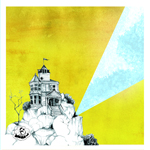|
|
 |
Dusted Reviews
Artist: 3 Leafs Album: Space Rock Tulip Label: self-released Review date: Jul. 2, 2010 |

|
|
|
 |
What do Bay Area psych rockers do between gigs? A good number of them take a busman’s holiday in this so-far not much heralded but excellent side project, 3 Leafs. Diego Gonzales, the bass player from Citay, the Dry Spells and various other projects seems to be the ringleader here, but you can also catch SF Weekly “best drummer” Warren Huegel on this disc, along with Black Fiction/Fresh & Onlys singer Tim Cohen and Ezee Tiger’s crazed one-man punk noise phenom Antony Petkovic. Six Eye Columbia knob manipulator Josh Pollock is on board with samples, and Chris Cones, who like many of these dudes has passed through SubArachnoid Space, is playing guitar. Everybody on the MySpace page is credited with playing “delay” and, indeed, a heavy miasma of echo hangs over the whole enterprise. You could get lost in these tracks, even given the clean line of bass-and-drum rhythm that runs through them like a rope guide.
As you might expect from the lineage, this self-released vinyl trips through heavy Can country, with extended, hallucinatory repetition, freaked-up guitar effects and occasional experiments in non-western sounds. “No Control/Acorn” sets the template, arising glacially out of a mess of bowed guitars, the drums coming in faintly at first, then louder, as if approaching from a long way off. There’s a wavery, Middle Eastern sort of flute sound, most likely synthesized, that plays primitive counterpoint to the space-tunneled guitar oscillations that ping and squiggle and reverberate throughout. A sense of procession in this track might remind you of Om, yet it is far less ethnic, less organic and less physical. If there’s movement, it’s a cerebral kind, the kind of journey that happens mostly inside your head. The “No Control” portion of this track gradually picks up density, building to a climax around the 11 minute mark. Then, without any real break, “Acorn” starts, the percussion shifting into a meterless, freeform frenzy, futuristic keyboards bubbling up in scale-climbing riffs that sound, at least at first, disconcertingly like the beginning of Steve Miller Band’s “Fly Like an Eagle.”
After “No Control/Acorn” the tracks are more modestly sized and digestible, exploring distinct but overlapping realms of psychedelic inquiry. “Realize Your Worth,” anchored by monumental bass and overlayed with delayed vocals, has the ponderous weight of melted dub. “Semuta Diaries” turns its inner eye onto more rustic, freak-folky forms, a la Fursaxa or Spires that in the Sunset Rise, its loose flurries of picked guitar tethered to dark and minor chords. And “Dyani,” the album’s best cut, is a manic, headlong rush that nods to Can, Afrobeat and tripped-out Funkadelic (R.I.P. Garry Shider).
The title track closes things out, like the opener allowing its music to blossom slowly out of an indeterminate murk of sounds. The whole thing is an oceanic haze of cymbal rolls and sustained notes until Gonzalez’ bass comes nosing up out of the depths, giving a rhythmic shape to the enterprise. Even so, it’s mostly an exercise in tone, as interleaved guitar effects shift and shimmer in relation to one another, first one, then the other taking over the top layer, then sinking slippery to the bottom.
All these tracks are loose and improvised, seemingly driven less by how they would sound to other people than how they sound to the players involved. Listening to Space Rock Tulip is like eating at a club where chef’s cook for each other after hours. The skill is there, the ingredients excellent and the presentation ever so slightly jacked up by competition among peers. They’re making it for each other and they could care less whether you like it…but you will.
By Jennifer Kelly
|







